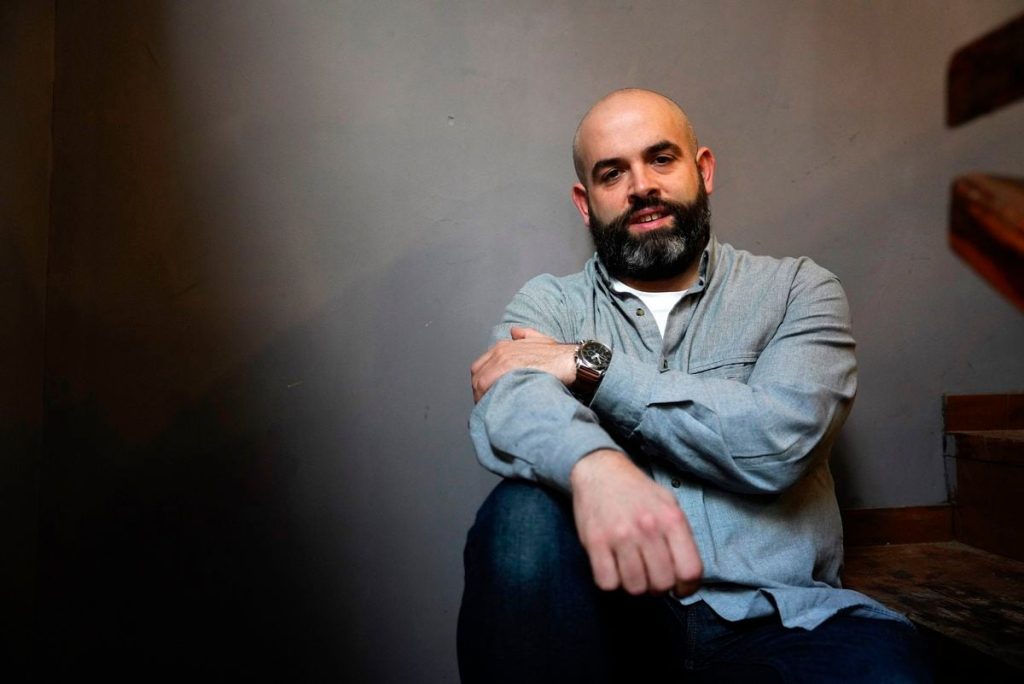Pablo Batalla Cueto, a 37-year-old from Gijón, has always been passionate about the mountains, a love that began in his childhood when he went camping with his father and a teacher from school. Over time, he noticed changes in the mountaineering experience, such as the introduction of technical clothing and overcrowding, as well as a shift from companionship to individualism and competition. These observations led him to write an essay titled La virtud en la montaña. Vindicación de un alpinismo lento, ilustrado y anticapitalista (Trea, 2019), where he denounced the neoliberal influence in the world of mountaineering. This work gained him recognition, following his previous publications like Si cantara el gallo rojo (Trea, 2017) and Los nuevos odres del nacionalismo español (Trea, 2021).
Batalla studied History and a Master’s Degree in Heritage Management at the University of Salamanca, but pursued a career in journalism, collaborating with various media outlets and leading projects like the newspaper A quemarropa at the Semana Negra de Gijón, and the cultural magazine El Cuaderno. His writing combines erudition and depth with a clear literary ambition. Additionally, he has spent years documenting the recent history of the leftist movement in Asturias through in-depth interviews with key figures. His upcoming book, La ira azul. El sueño milenario de la Revolución (Trea, 2023), draws inspiration from the idea of revolution as portrayed by Luis Cernuda, shifting the traditional perception of revolution as fiery and warm to something cold and destructive, like the sea.
In a recent interview, Batalla discusses his research on the resurgence of Spanish nationalism and its connection to contemporary phenomena like the success of certain works and cultural expressions that evoke nationalist sentiments. He argues that nationalism has become a new form of religion, fulfilling a void left by traditional religious beliefs in decline. Drawing parallels with historical revolutions, he suggests that we are on the cusp of a new era of revolutions, likely triggered by climate change, leading to eco-fascist or eco-socialist outcomes based on the equitable distribution of scarce resources.
Batalla explores the concept of revolution further by highlighting the complex dynamics at play between revolutionary and counterrevolutionary forces. He challenges conventional notions of revolution as a singular event by emphasizing its prolonged and multifaceted nature, with shifts in allegiances and ideologies occurring within the broader revolutionary movements. He notes a growing trend where the right appropriates revolutionary imagery and language, while the left adopts a more defensive stance, using terms like social shield, resistance, and anti-fascist alert. These shifts reflect a broader societal engagement with revolutionary ideals across various spheres of life.
Beyond politics, Batalla delves into the broader cultural fascination with revolution, which extends to technological innovations, literature, fashion, and even cleaning methods. He reflects on the contemporary inflation of revolutionary rhetoric and the complexities of motivating individuals to sacrifice for a cause, whether it be revolution, religion, or war. Drawing on historical examples, he demonstrates how societal conditions influence individuals’ willingness to engage in revolutionary acts, highlighting the interplay of personal, ideological, and societal factors in shaping revolutionary movements.
Batalla also discusses the feminist revolution as a key transformative force of our time, noting the aesthetic appeal and powerful messaging of feminist activism. He underscores the parallels between revolutionary and religious fervor, suggesting that these movements fulfill a human need for belief and collective action. By examining the intersections of revolution, religion, and ideology, Batalla offers a nuanced perspective on the enduring appeal and complexities of revolutionary movements in shaping individual and collective identities.


